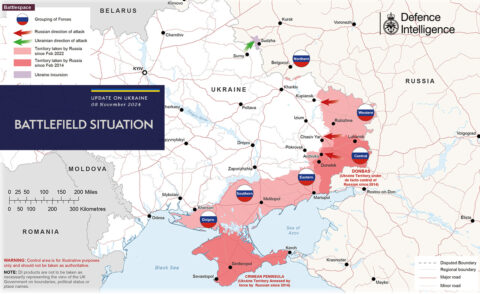In his weekly commentary, Niccolo Soldo considers what the incoming Trump administration might do about the war in Ukraine:
… Ukraine is losing the war, and is losing it at a faster pace than before. Time is not on Kiev’s side, and there is no magic wand that anyone can wave to turn the tide in its favour. The question is: how much is Kiev willing to give up in order to save as much as it can?
The foreign policy blob is on tenterhooks, waiting to see what Trump will do regarding this conflict:
Like in Trump’s first term, different factions are set to compete to influence the Republican’s foreign policy. More traditionally minded allies such as Mike Pompeo, the former secretary of state now in contention to lead the Pentagon, are likely to push for a settlement that doesn’t appear to give a major win to Moscow. Other advisers, particularly Richard Grenell, a top candidate to lead the State Department or serve as national-security adviser, could give priority to Trump’s desire to end the war as soon as possible, even if it means forcing Kyiv into significant concessions.
Pompeo is out, but that doesn’t mean that those like him are entirely out either, as he has DoD officials sharing his views. No doubt that there are certain elements in the State Department, CIA, and in Congress as well who take the same position.
The proposals all break from Biden’s approach of letting Kyiv dictate when peace talks should begin. Instead, they uniformly recommend freezing the war in place — cementing Russia’s seizure of roughly 20% of Ukraine — and forcing Ukraine to temporarily suspend its quest to join the North Atlantic Treaty Organization.
One idea proposed inside Trump’s transition office, detailed by three people close to the president-elect and not previously reported, would involve Kyiv promising not to join NATO for at least 20 years. In exchange, the U.S. would continue to pump Ukraine full of weapons to deter a future Russian attack.
Under that plan, the front line would essentially lock in place and both sides would agree to an 800-mile demilitarized zone. Who would police that territory remains unclear, but one adviser said the peacekeeping force wouldn’t involve American troops, nor come from a U.S.-funded international body, such as the United Nations.
“We can do training and other support but the barrel of the gun is going to be European,” a member of Trump’s team said. “We are not sending American men and women to uphold peace in Ukraine. And we are not paying for it. Get the Poles, Germans, British and French to do it.”
“Pumping” Ukraine full of weapons would be attractive to Trump, as it means steady cash flow. He is a businessman after all.
The last bit is the most important, as it conforms to US policy trends in which the dumpster fire that they started is left to the Europeans to extinguish while the Americans go deal with the Chinese.
That proposal in some respects echoes comments made by Vice President-elect JD Vance during a September interview, when he suggested a final agreement between Ukraine and Russia could involve a demilitarized zone “heavily fortified so the Russians don’t invade again.” Russia, Vance continued, would get to keep the land it has taken and be assured of Ukraine’s neutrality.
“It doesn’t join NATO, it doesn’t join some of these sort of allied institutions,” he said on “The Shawn Ryan Show,” a podcast.
“No NATO, no stealth NATO”, is music to Moscow’s ears. The problem here is that the Russians do not trust the Americans to keep up their end of any deal. Russian Foreign Minister Lavrov has famously described the Americans as “agreement non-capable”.
Also, why would the Russians even agree to negotiate at this point?
For one, Ukraine and Russia still have vastly differing war aims and little desire to alter them. With Russian troops advancing slowly but steadily in Ukraine, the Kremlin has shown little inclination to negotiate, and has shown its willingness to escalate the conflict with hybrid attacks outside its borders, such as sabotage operations in Europe.
“The objectives of the special military operation remain unchanged and will be achieved,” Dmitry Medvedev, a top Russian official, posted Wednesday to X after learning of Trump’s victory over Vice President Kamala Harris, the Democratic presidential nominee.
Zelensky is over a barrel:
Zelensky, whose country is heavily dependent on the U.S. for military and financial assistance, could — more easily than Putin — be forced by Trump to negotiate, but the Ukrainian leader would have to contend with a public that views ceding territory as capitulation to Moscow.
Trump has said that Ukraine’s survival is important to the U.S., but has repeatedly criticized Zelensky, calling him the “greatest salesman”, a stance that has worried some officials in Kyiv that a Trump-led U.S. might push for a settlement that favors Russia.
Zelensky on Wednesday congratulated the president-elect on his victory, appealing to their September meeting in New York and praising his “‘peace through strength’ approach in global affairs”.
Forcing Zelensky to concede land would open up the possibility of a coup d’etat in Kiev, and even civil war. Even if a deal were hammered out, Zelensky would be forced to try to sell it at home. There are may factions in Ukraine that have no desire to budge even one inch, and would happily take his head off of the rest of his body to make sure that no one signs away any Ukrainian land.




